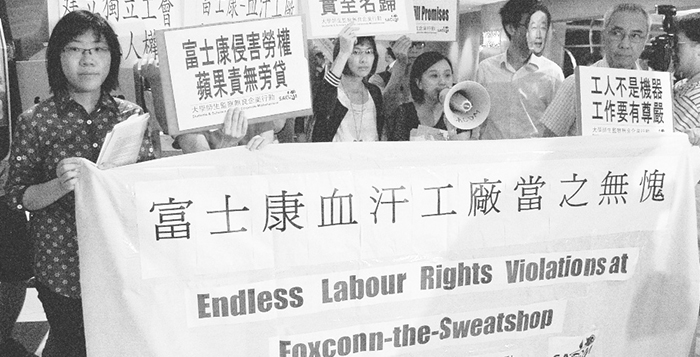The publicity surrounding Silicon Valley’s newest spawn, the iPhone 6, seems to be increasing exponentially.
News outlets from USA Today to Forbes magazine have praised the ingenuity of the sixth edition of Steve Job’s most successful invention. Other news coverage extol the smartphone’s aesthetic appeal. Consumer Technology Editor Matt Warman from the Daily Telegraph writes “the new iPhone 6 is ‘the most beautiful phone ever made.” However, in the midst of the seemingly endless glorification of a piece of polycarbonate, the world should take a step back and look beyond the iPhone’s glistening eight-megapixel lens. Sometimes, if one were to listen closely enough, one might be able to hear screaming coming from the mouths of millions of broken souls.
Unbeknownst to the majority of the Western world, the price of the iPhone is in fact dirt cheap compared to the sacrifices made by ordinary people in order to create the product. Each day, people in Asian countries channel every single ounce of their energy into putting together these so-called handheld miracle machines.
Workers in Wuxi, China who are employed by Apple, have, in the past year, received media attention concerning the appalling hours and deplorable conditions in which they work. Often, these workers work 12-hour days assembling iPhones. In turn, they make only about 1,500 Chinese Yuan a month, approximately 245 US dollars. Furthermore, they are forced to sleep in cramped quarters, with up to eight people sharing a room at one time.
These inhumane conditions have lead to many of the employees to contemplate and even attempt suicide. On March 17, 2010 in another Apple-based factory known as Foxconn located in Longhua, Taiwan, 17-year-old Tian Yu threw herself from the fourth floor of the workers’ dormitory she had been living in, paralyzing herself from the waist down.
Yu had been forced to assemble parts of iPads and iPhones for over 70 hours a week, including during her lunch breaks which she had to skip in order to keep on schedule. The stress of having to complete such an enormous amount of work led Yu to give up on her life completely.
In 2010, 14 of 18 workers who had attempted to commit suicide at Foxconn died. The other four, including Yu, survived. Unfortunately for Yu, that meant carrying on with her difficult life as a paraplegic.
Workers like Yu all come from fairly similar backgrounds. In 2013, Leslie Chang, a reporter from The Wall Street Journal in China, led a TED Talk entitled “What Are The Lives of Chinese Factor Workers Really Like?” In it, she discusses what the workers she had met were really thinking and how people from Western countries can be quick to see these workers as “faceless masses.” Chang speaks about one woman in particular, 18-year-old Lu Qing Ming, who explained to Chang her mentality: “a person should have some ambition while she is young, so that in old age she can look back on her life and feel that it was not lived to no purpose.”
Chang goes on to explain that 150 million workers in China, just like Ming, leave their farming villages to work in factories, restaurants and hotels of big cities, making up the largest migration in history. These workers, many of them young women, do this in order to achieve more in life than their parents had. Ming had a dream to live a life other than that of a farmer, a dream that was not unlike any typical American adolescent. She too wanted to have the privilege of buying an Apple product and live in her own apartment. However, her story and her path are much more difficult than anyone who does not share the same situation could ever fathom.
Behind the facade that Apple and other major corporations want us to see, there are millions of people with stories and souls, waiting for their moments to break free. Corporations such as Foxconn and Apple are businesses that care about mass advertisement and gross income, not the individual lives of each employee. Ironically, these factories that these migrant workers see as a gateway to a better life, are actually industries that break the dreams of young spirits in exchange for, as Chang puts it, “Coach handbags on our shoulders, Nikes on our feet and iPhones in our pockets.”
While Americans may recognize that these products are convenient and useful, they must also realize that these material items have dehumanized millions of people that will never have their stories told.
– By Jesse Wang
The Emory Wheel was founded in 1919 and is currently the only independent, student-run newspaper of Emory University. The Wheel publishes weekly on Wednesdays during the academic year, except during University holidays and scheduled publication intermissions.
The Wheel is financially and editorially independent from the University. All of its content is generated by the Wheel’s more than 100 student staff members and contributing writers, and its printing costs are covered by profits from self-generated advertising sales.





